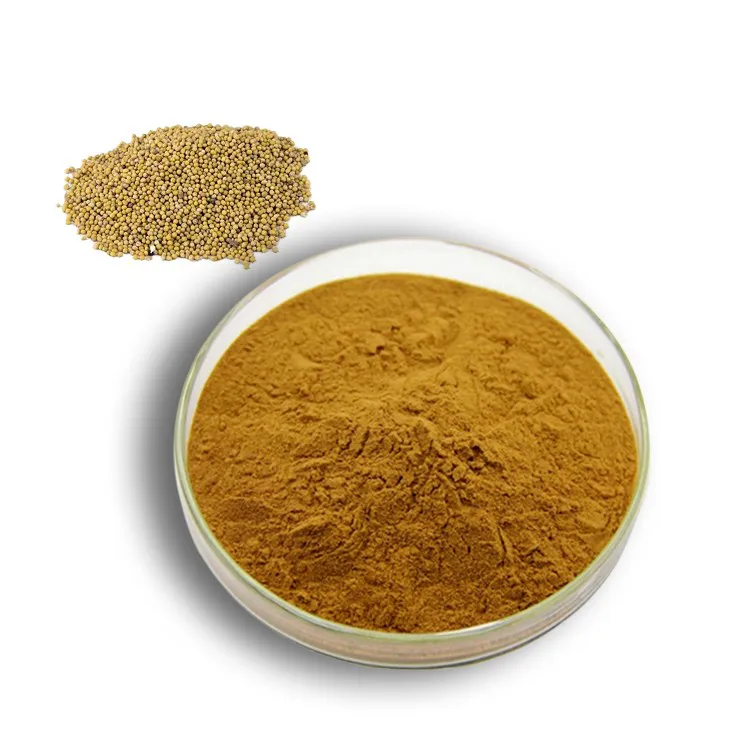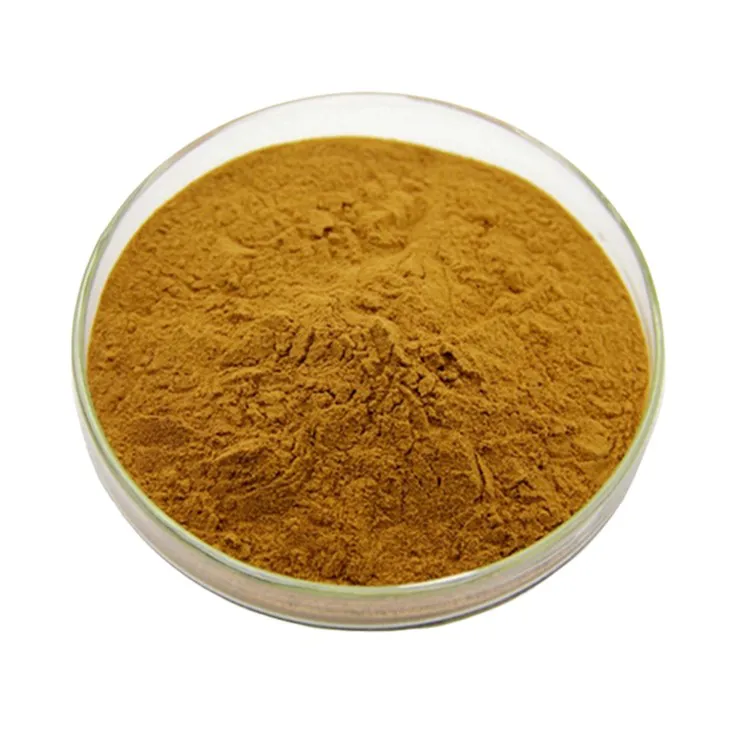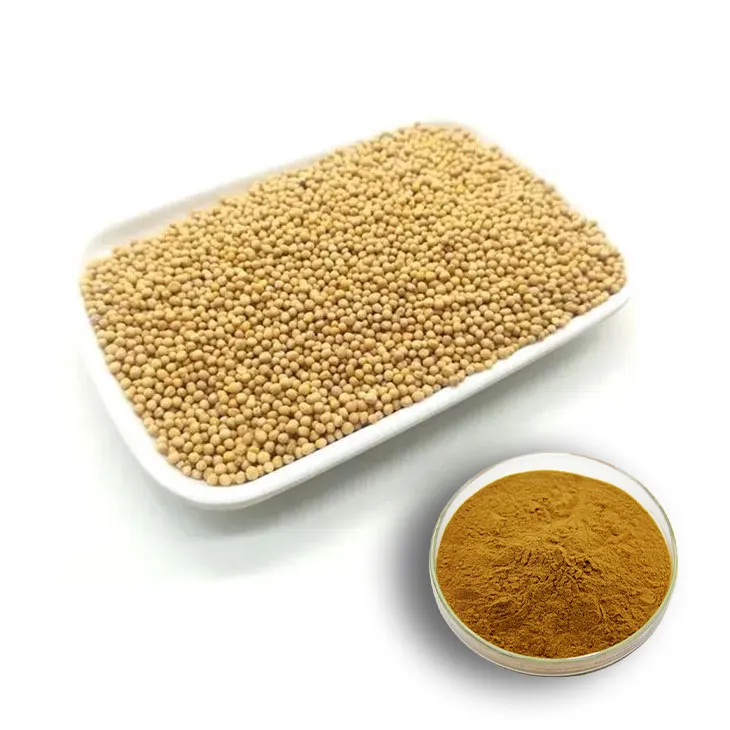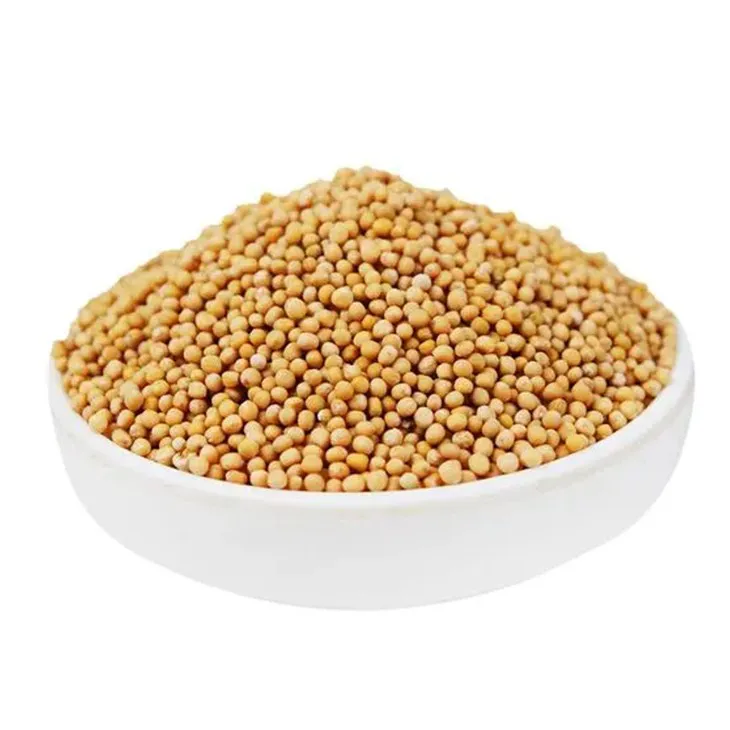- 0086-571-85302990
- sales@greenskybio.com
Organic white mustard seed extract of trace components.
2024-11-27

1. Introduction
Trace components often play a significant yet underestimated role in various aspects of our lives. One such trace component is the organic White mustard seed extract. White mustard, scientifically known as Sinapis alba, has been used for centuries in different cultures. However, the extract of this plant, especially when obtained through organic means, is a subject that has recently started to gain more attention in multiple fields.

2. The Source: White Mustard
White mustard is an annual plant that is native to the Mediterranean region but is now widely cultivated across the world. It has a long history of human use, dating back to ancient times.
2.1. Growth and Cultivation
White mustard is relatively easy to grow. It prefers well - drained soil and a temperate climate. Organic cultivation of white mustard involves avoiding the use of synthetic pesticides and fertilizers, which results in a more natural and potentially healthier product. This form of cultivation also has environmental benefits, as it reduces chemical runoff into the soil and water.
2.2. Chemical Composition of the Seed
The white mustard seed contains a variety of components. It has a significant amount of protein, which is important for its potential nutritional value. Additionally, it contains oils, carbohydrates, and a range of bioactive compounds. These bioactive compounds are of particular interest when it comes to the extract, as they are the source of its potential properties.

3. Health - related Properties
The organic White mustard seed extract may possess several health - related properties, making it a potentially valuable addition to the field of natural health products.
3.1. Antioxidant Properties
Antioxidants are substances that can neutralize free radicals in the body. Free radicals are unstable molecules that can cause damage to cells and are associated with various diseases and the aging process. The bioactive compounds in the White mustard seed extract may act as antioxidants. For example, certain phenolic compounds present in the extract have been shown in preliminary studies to have antioxidant activity. These compounds can scavenge free radicals, reducing oxidative stress in the body.
3.2. Anti - inflammatory Properties
Inflammation is a natural response of the body to injury or infection, but chronic inflammation can lead to a host of health problems, including heart disease, diabetes, and arthritis. The organic white mustard seed extract may have anti - inflammatory properties. Some of the compounds in the extract are thought to modulate the body's inflammatory response. They may interfere with the production of inflammatory mediators, such as cytokines, reducing the overall level of inflammation in the body.
3.3. Potential Digestive Benefits
White mustard has been traditionally used to aid digestion. The extract may continue this tradition in a more concentrated form. It could potentially stimulate the production of digestive enzymes, helping the body break down food more efficiently. Additionally, it may have a mild laxative effect, promoting regular bowel movements.

4. Culinary Applications
The use of white mustard in cooking is well - known, and the extract can offer unique advantages in the culinary world.
4.1. Flavor Profile
The organic white mustard seed extract has a distinct flavor. It is sharp, pungent, and slightly bitter. This flavor can add depth and complexity to a wide variety of dishes. It is often used in salad dressings, where it can provide a tangy and zesty note. In marinades for meats, it can penetrate the meat and enhance its flavor.
4.2. Aroma Contribution
Not only does the extract add flavor, but it also contributes to the aroma of dishes. When used in cooking, it releases a characteristic smell that can stimulate the appetite. In baking, for example, a small amount of white mustard seed extract can add an interesting and unexpected aroma to bread or pastries.
4.3. Preservative Qualities
Some of the compounds in the white mustard seed extract may have preservative properties. In traditional food preservation methods, mustard was sometimes used to prevent spoilage. The extract could potentially be used in a similar way in modern food processing, helping to extend the shelf - life of certain products.

5. Cosmetic Applications
The potential benefits of the organic white mustard seed extract are not limited to health and food; it also has applications in the field of cosmetics.
5.1. Skin Health
The antioxidant and anti - inflammatory properties of the extract can be beneficial for skin health. Antioxidants can protect the skin from damage caused by environmental factors such as UV radiation and pollution. The anti - inflammatory properties may help soothe irritated skin and reduce redness. It could potentially be used in creams, lotions, and serums for various skin types.
5.2. Hair Care
There is also potential for the use of the extract in hair care products. It may help improve the condition of the scalp by reducing inflammation and promoting a healthy environment for hair growth. Additionally, it could add shine and strength to the hair, although more research is needed in this area.
6. Extraction Methods
The extraction of the organic white mustard seed extract is a crucial step in harnessing its potential properties.
6.1. Solvent Extraction
One common method is solvent extraction. This involves using a solvent, such as ethanol or hexane, to dissolve the bioactive compounds from the white mustard seeds. The choice of solvent can affect the quality and composition of the extract. Ethanol is often preferred in organic extraction processes as it is considered a more natural and less toxic solvent compared to hexane.
6.2. Supercritical Fluid Extraction
Supercritical fluid extraction is a more advanced method. In this process, a supercritical fluid, usually carbon dioxide, is used as the extracting agent. This method has several advantages, including a higher selectivity for specific compounds and the ability to operate at lower temperatures, which helps preserve the integrity of the bioactive compounds in the extract.
7. Current Research and Future Prospects
Although there has been some research on the organic white mustard seed extract, there is still much to be explored.
7.1. Research Gaps
One of the main research gaps is in understanding the full range of bioactive compounds in the extract and their specific mechanisms of action. While some antioxidant and anti - inflammatory properties have been identified, there may be other potential benefits that are yet to be discovered. Additionally, more in - vivo studies are needed to confirm the effects observed in vitro.
7.2. Future Applications
In the future, the organic white mustard seed extract could potentially be developed into a wide range of products. In the health industry, it could be formulated into dietary supplements or functional foods. In the culinary world, new products such as gourmet mustards or flavor enhancers could be created. And in the cosmetics industry, it may find its way into more specialized skin and hair care products.
8. Conclusion
The organic white mustard seed extract is a remarkable trace component with potential applications in health, culinary, and cosmetic fields. While more research is needed to fully unlock its potential, the current knowledge about its antioxidant, anti - inflammatory, flavor - adding, and skin - benefiting properties makes it an exciting area of study. As the demand for natural and organic products continues to grow, the organic white mustard seed extract may become an increasingly important ingredient in various products.
FAQ:
What are the bioactive compounds in organic white mustard seed extract?
Organic white mustard seed extract may contain bioactive compounds such as glucosinolates. Glucosinolates are known for their potential antioxidant and anti - inflammatory properties. Additionally, there could be other compounds like phenolic acids and flavonoids, which also contribute to the overall bioactivity of the extract.
How can organic white mustard seed extract be used in cooking?
The extract can be used in cooking in several ways. It can be added to marinades for meats or vegetables to impart a unique flavor. It can also be used in salad dressings, sauces, or soups. When used in small amounts, it adds a tangy and slightly spicy flavor along with a pleasant aroma to the dishes.
What benefits does organic white mustard seed extract offer for skin health?
For skin health, the extract may have antioxidant properties that can help protect the skin from free radical damage. It might also have anti - inflammatory effects, which could be beneficial for skin conditions such as acne or eczema. Additionally, it may contribute to skin hydration and firmness, although more research is needed in this area.
How is organic white mustard seed extract obtained?
Organic white mustard seed extract is typically obtained through a process of extraction. First, the white mustard seeds are harvested. Then, they are often ground or crushed to increase the surface area. Solvents such as ethanol or water can be used to extract the active components from the seeds. After extraction, the solvent is removed, leaving behind the concentrated extract.
Are there any potential side effects of using organic white mustard seed extract?
While organic white mustard seed extract is generally considered safe, some people may be allergic to mustard. Ingesting or using the extract in large amounts may cause irritation in the digestive tract or on the skin. Pregnant or breastfeeding women should also consult a healthcare provider before using products containing the extract.
Related literature
- The Bioactive Compounds in Mustard Seeds and Their Potential Health Benefits"
- "Organic Extracts in Culinary and Cosmetic Applications: A Focus on White Mustard"
- "White Mustard Seed Extract: Chemical Composition and Its Role in Skin Health"
- ▶ Hesperidin
- ▶ Citrus Bioflavonoids
- ▶ Plant Extract
- ▶ lycopene
- ▶ Diosmin
- ▶ Grape seed extract
- ▶ Sea buckthorn Juice Powder
- ▶ Fruit Juice Powder
- ▶ Hops Extract
- ▶ Artichoke Extract
- ▶ Mushroom extract
- ▶ Astaxanthin
- ▶ Green Tea Extract
- ▶ Curcumin
- ▶ Horse Chestnut Extract
- ▶ Other Product
- ▶ Boswellia Serrata Extract
- ▶ Resveratrol
- ▶ Marigold Extract
- ▶ Grape Leaf Extract
- ▶ New Product
- ▶ Aminolevulinic acid
- ▶ Cranberry Extract
- ▶ Red Yeast Rice
- ▶ Red Wine Extract
-
Polygonum Cuspidatum Extract
2024-11-27
-
Okra Extract
2024-11-27
-
Giant Knotweed Extract
2024-11-27
-
Grape Leaf Extract
2024-11-27
-
Hops Extract
2024-11-27
-
Peppermint Oil
2024-11-27
-
Red Wine Extract
2024-11-27
-
Red Vine Extract
2024-11-27
-
Acerola Extract
2024-11-27
-
Lotus leaf extract
2024-11-27





















